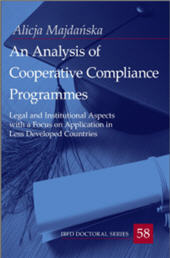An analysis of cooperative compliance programmes : legal and institutional aspects with a focus on application in less developed countries
xix, 510 p.
Includes bibliographical references (p. 457-510).
The recent developments in the international tax agenda prove that the need for a revival of cooperative compliance programmes is greater than ever before. Regardless of whether one places cooperative compliance programmes in the context of the post-BEPS world, mandatory disclosure rules (which are about to become effective in the European Union) or the discussion about the tax implications of e-commerce, it is in the public interest to ensure a framework for a mature, argument-based and (ideally) real-time discussion between tax administrations and large business taxpayers. The benefits of cooperative compliance programmes may prove particularly important in the post COVID-19 environment, when countries will be looking for ways to recover from the crisis.
This book analyses how to ensure that the implementation of the concept of cooperative compliance is underpinned by sound legal principles and enhanced by a robust institutional framework, with a particular focus on the application of the concept in less developed countries. In the context of less developed countries, the concept of cooperative compliance is presented as a legal transplant, able to “travel” across countries, legal systems and legal cultures. The book shows not only how tax administrations and taxpayers may benefit from cooperative compliance programmes, but also what the potential bottlenecks are.
As such, this book promotes the concept of cooperative compliance as a viable solution to the many challenges faced by not only developed countries, but also less developed ones. It contributes to tax policy formulations by providing clear recommendations on the design of a cooperative compliance programme, highlights the potential legal and institutional bottlenecks and presents some good practices on how a cooperative compliance programme can be developed. As such, it offers useful guidance for lawmakers and tax administrations planning to implement cooperative compliance programmes. [Publisher's text]
Thesis.
1277747 characters
-
Información
ISBN: 9789087226787
COLECCIÓN



 EPUB
EPUB